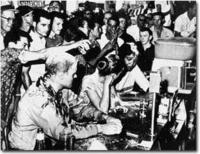• Posted By landismom @ 10/23/2005 08:28:00 PM • • •
Sunday, October 23, 2005
reading recommendation
I just finished reading this really interesting book called Hey Waitress: The USA from the Other Side of the Tray by Allison Owings, a book that has been on my Powell's wishlist for a few years (and incidentally, I originally heard of in The Women's Review of Books). It's an well-researched book--a series of oral history interviews with a variety of waitresses, including a woman who worked the lunch counter at the Woolworth's in Greensboro, NC that was famously desegregated by a student sit-in (shown here).
 The woman points out that the first African Americans to actually EAT the counter (as opposed to sitting and having ketchup poured into their hair) were from the kitchen staff--the owner had them come in in their uniforms, and then go off to a different part of the store to change into regular clothes, and sit down as the first black customers, so that he could be sure they wouldn't do anything crazy. Owings (with the white waitress's help) tracks down one of those kitchen workers, who admits that they didn't really eat--just inhaled the food, because they were so scared. In addition, Owings interviews one of the women who sued to get hired at a high-end New York restaurant, and a woman who went from being a nun to being a waitress, just to name a few.
The woman points out that the first African Americans to actually EAT the counter (as opposed to sitting and having ketchup poured into their hair) were from the kitchen staff--the owner had them come in in their uniforms, and then go off to a different part of the store to change into regular clothes, and sit down as the first black customers, so that he could be sure they wouldn't do anything crazy. Owings (with the white waitress's help) tracks down one of those kitchen workers, who admits that they didn't really eat--just inhaled the food, because they were so scared. In addition, Owings interviews one of the women who sued to get hired at a high-end New York restaurant, and a woman who went from being a nun to being a waitress, just to name a few.It's rare for books about labor to focus on 'women's work' at all, much less to focus on individual women doing that work with dignity. And waitressing seems to cross class lines for a lot of women. I know a number of men--my husband included--who have never had a job in food service. But I don't know any women who I can say that about--even women I know who have high-level corporate jobs have some kind of waitressing in their backgrounds.
The book reminded me of my own days as a waitress, and what a love-hate relationship I had with those jobs. On the one hand, I found waitressing to be highly lucrative. I usually worked nights, and could routinely earn $150-200 in tips over two weekend shifts--which was way more than I earned at any other service-level job. In fact, I probably earned more per hour (with tips factored in) as a waitress than I did at anything I ever did, until I became a word-processor at an evil corporate law firm in my late twenties. I also liked the feeling of being on the inside, because you do get that 'back of the house' element in service work. On the other hand, I hated being relentlessly pursued by the male customers, and the smell of a walk-in refrigerator is still enough to make me cringe. When I quit my last restaurant job, I swore I'd never work in food service again. That wasn't true--I ended up working for a catering company for a while, which had all of the ills and none of the advantages (ie--no tips) of restaurant work. But I'm pretty happy that I can say I haven't done any kind of food service work at all (unless you count waiting on my kids) for over 10 years.
One of the things that the book gets right is how vulnerable most waitresses & waiters are to exploitation. The minimum wage law in this country allows restaurants to pay their workers less than the federal minimum wage (the minimum you can legally pay a tipped employee is $2.13 per hour), under the theory that with tips, they will make more than minimum wage. Of course, plenty of restaurant employers are ethical, and don't try to cheat their staff out of tips. But even in an ethical restaurant, you're at the mercy of the customers. And if they're having a bad day, or just an ass, you're the one who suffers.
In my current work life, I've recently gotten to know some restaurant workers who don't work for an ethical employer. They've told me stories about their employer's failure to pay them overtime, and his failure to pay them their last paycheck if they quit, and some others have come forward to talk about how that same employer steals their tips, or makes them do non-tipped work (for example, kitchen prep) at the tipped hourly rate.
I took the Bee out to dinner tonight (a reward for good behavior after I had to take her to a meeting with me), and we had long conversation about the work of restaurant employees, my time as a waitress, and the different options that people have to win respect on the job (as well as the lengths that some people have to go to get respect). I'm glad that Owings wrote this book, which sparked such a captivating talk with my daughter.
<< Home

